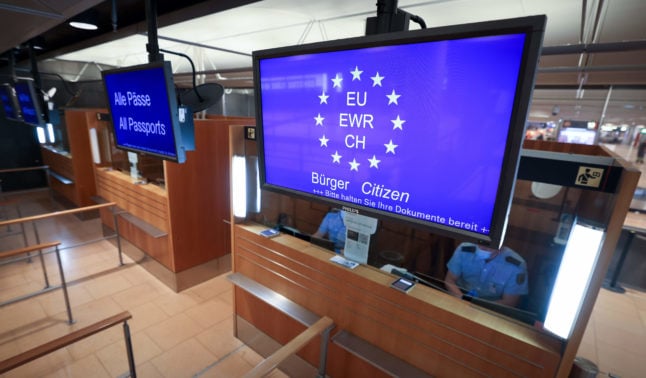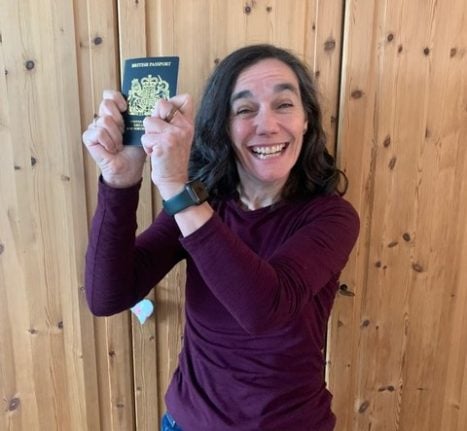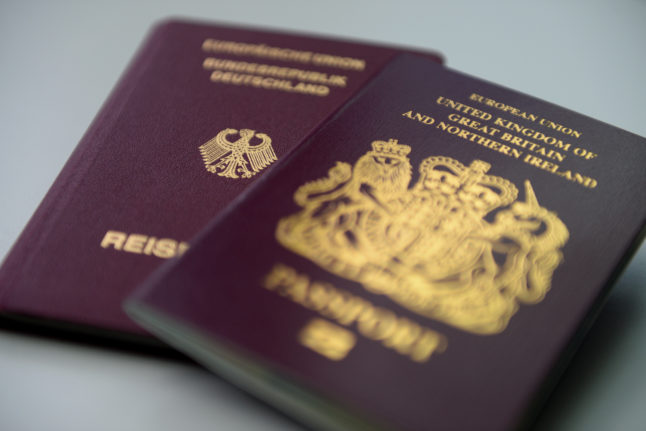Michelle Jung runs a childcare centre and lives in the Schwarzwald (Black Forest) area. She moved to Germany from the UK in the mid-1990s.
There are many ways to increase your stress levels. Some all-time favourites of mine are trying to rebook a flight and telephone banking. But of all the memorable, blood-surging and heart muscle-tightening moments that I have experienced, nothing can top the interlude I have had with the passport office in the UK these last months. For those Brits living across in Germany who would also like to increase their stress levels, please read on and hear my story.
Earlier on this year I discovered that my British passport needed to be renewed at the latest in September. Being the efficient and foreseeing person that I am (well partly) I decided to get on with the procedure quickly, leaving plenty of time for unexpected difficulties. As an expat living in Germany and extremely far away from the British Embassy, the only possible way to go about my passport renewal was to do it online. I read up beforehand and collected all the necessary documents to send away. It all seemed relatively straightforward and I was confident that I would soon be holding my newly issued passport in my hand (small break for a chuckle).
READ ALSO: How foreigners can get fast track citizenship in Germany
‘Queezy feeling’
I hit my first obstacle at the local passport studio where a kind but over-challenged – and probably not the most cosmopolitan photographer in the world – told me that he doesn’t offer digital codes for international passports. He said he’d heard of something of the kind as if he were saying, “Oh yeah, I’ve heard of that rare breed of Mongolian wild horses.” Not to be discouraged, I phoned around various photo studios in the Black Forest. I was slightly perturbed to find that no photo studio in this region offers this service.

Never one for being put off lightly I went back to the UK passport website and discovered that I could install an app on my phone to take my own passport photo. The App is free and seemed user friendly. It’s not possible to use on your own, but hey, why have we got husbands? My husband and I went through all the steps thoroughly and managed to take what I thought was a jolly good passport photo. The photo cost five pounds to submit but at least I now had everything needed for my passport renewal.
According to the passport website, all documents needed to be sent to Durham, England (which I assumed was a kind of passport office headquarters in the UK). I had a queasy feeling sending my original British passport off in the post but apart from it getting lost what could go wrong? Just to be on the safe side I sent everything as registered mail. As I have dual citizenship (thank God) I also needed to send a copy of my German passport. The £150 fee was transferred with online banking. After everything was submitted I smugly rubbed my hands with glee and ticked off point “renew passport” on my to-do list. Shortly after, I received a mail from the passport office to confirm that they had got my application. That was May 29th.
Two weeks later I received a kind and quirky mail from the passport office informing me that my passport photo didn’t meet the requirements and a new one was needed. I wasn’t too unsettled and since I didn’t technically take the photo and could put all the blame on my husband I was optimistic enough to think I could send another photo via the app. Together we thoroughly examined the instructions in the app and after what seemed like a two-hour photo session we came up with an extremely professional-looking passport photo. The photo was submitted on the same day – with another five pound payment – and shortly after we received a confirmation from the passport office.
Two weeks later we received the same friendly and slightly quirky mail informing us that the photo didn’t meet up to required standards. In the meantime, I received a separate mail from the passport office informing me that I needed to send a copy of my German passport to the Liverpool passport office. Now I was at a loss. How on earth do I get an accepted photo sent across? And why do I suddenly need to send a document which has been sent to Durham to Liverpool?
Communication breakdown
Since all previous mail from the passport office was written anonymously and in an aggravatingly machine-like manner, I decided to try my luck with the customer service hotline to sort out these problems. If you have money to waste and bags of time during the day you might want to try this hotline yourself. It’s a simple procedure really: you dial a number, go through a series of standard questions (don’t forget to say that you don’t want the call in Welsh), wait half an hour listening to Beethoven’s 6th Symphony, get through to someone who, after hearing your story tells you he can’t help and will put you through to someone else, wait a further half hour with classical music in the background before getting someone new at the other end.
At this point of the procedure the call can go in three different directions (I’ve experienced all three of them). Firstly, the person can say they can’t find your application in the system and you burst dramatically into tears. Secondly, the person can listen patiently to your story and tell you how terribly awful you have been treated and encourage you to write a cover letter (despite the passport office sending mails informing all recipients NOT to send a cover letter). The third response can be for a person to note down everything you’ve said and promise to pass on the information to the relevant department with an assurance that your case is now a priority and someone from the passport office will be in touch. Now it gets interesting. I was asked to give a phone number so that someone could speak directly with me. The only snag was that you could only give a UK number. Yes, you have heard right. A government body dealing with passports for people living overseas will only speak to them on the phone in the UK. Now I had to get my mum into this mess. She had just as much success as I had.
At the end of July I sent print photos taken at a passport studio with a cover letter to the Liverpool office. (Incidentally, during one of my many expensive phone calls I found out by chance that the Liverpool passport office was now responsible for my case). I got a confirmation that the photos had arrived but unfortunately my status in the application procedure never changed and I was still stuck in “waiting for approval”. Whilst out visiting my family at the beginning of August I decided to go to a photo studio and send a digital code to the passport office since I had received no approval from the print photos. The code was submitted but my status still didn’t change!
I sent seven emails of complaint. I’d like to think that I am a patient, friendly and articulate citizen who deals with all correspondence in a courteous and professional manner. But it became almost humorous when, after explaining in detail all the mishaps per mail, I then received the reply: “We are happy to inform you that your application was submitted on 29th May and is waiting approval.”

I have always been proud of being British and I have never ever contemplated the idea of giving up my British citizenship. But I have had several moments during the last months where I have seriously considered giving up. I sincerely hope that other readers have had better experiences than myself. However, I doubt it. After phoning up the British Embassy in a moment of desperation and hearing how they have received hundreds of calls like mine I can only assume that cardiologists all over Germany are being inundated with stressed-out, palpitating Brits needing heart surgery!
The Local got in touch with the UK Home Office to let them know about Michelle Jung’s account and ask them about the delay. A spokesperson from the HM Passport Office said: “In light of the difficulties in providing replacement photographs that were explained to us by Mrs Jung, her previously submitted photograph was reconsidered.
“This photograph was accepted as meeting the required standard on 29th July and, following the completion of our checks, Mrs Jung’s passport was issued on 8th September.”



 Please whitelist us to continue reading.
Please whitelist us to continue reading.
Sounds awful. Digital passport photos sounds nice. We still take physical photos and bring them in. Lucky for us, Americans here on behalf of NATO, there are passport offices on base that take care of everything for you and brand new passports come back within 4 weeks. It sounds daunting and I’m curious if an appointment and a day trip to the nearest UK embassy/consulate would have made things a lot easier for the author. I might have even bought a cheap roundtrip air ticket and gone back to the UK to renew my passport. 4 months is a crazy long time.
I am so sorry for her terrible ordeal. As an American, I have only the highest of praise for the Frankfurt Consulate office. I lost my passport a couple of years ago and they were very helpful. Everything was explained, my documents gathered and sent off. Within 4 weeks I had my new passport. Thanks to all the wonderful people at the Frankfurt US Consulate.
This feels like an intentional exaggeration for entertainment purposes 😉
Photo ‘digital codes’ are country specific – you can only get them in the UK for British passports, in Ireland for Irish passports, etc. Digital codes scheme requires photographers to register with the respective countries’ government and it is unrealistic to expect any photographer outside Britain to participate in it (and I’m not even sure if it is allowed by own xenophobic government).
What you can get instead in every photo studio (and nearly every photo kiosk) are digital passport photos sent to you by e-mail – which then you can directly upload to Passport Office’s website. That’s what I did and got my passport in less than a month (funny enough, I also live in Schwarzwald).
Firstly, sorry to hear this was such an ordeal.
Echoing Futurix’s post, I paid a photographer a small fee (20 Euro I think) to make sure I had a digital copy of a biometrics-compliant photo that I then uploaded without a code. After that my application was all fine and took less than a month. I think a lot of this is about when you apply. I heard Spring/Summer applications were subject to long delays.
I have had a similar ordeal applying for my daughter’s first British passport post Brexit (although the application was sent in well before Brexit), I had to prove so much more including my father having to contact the Ministry of Defence to prove that he was serving in Singapore at the time of my birth. (That also took ages and a lot of follow up on my father’s part). I was waking up in the night worrying. I was also not receiving the emails to my .de email address, although I did not know this so I missed a deadline by which the passport office would abort the application. So I lost the money, gave myself a long break before applying again. This time it went smoothly but it took a month after posting before acknowledgement of receipt and then 4 months before it came in the post!! I think the fees are exorbitant and downright insulting considering we are British citizens. My daughter’s German passport and my ID card did not cost nearly as much.
On the positive side, our local photographers studio here in Berlin did know about digital photos!